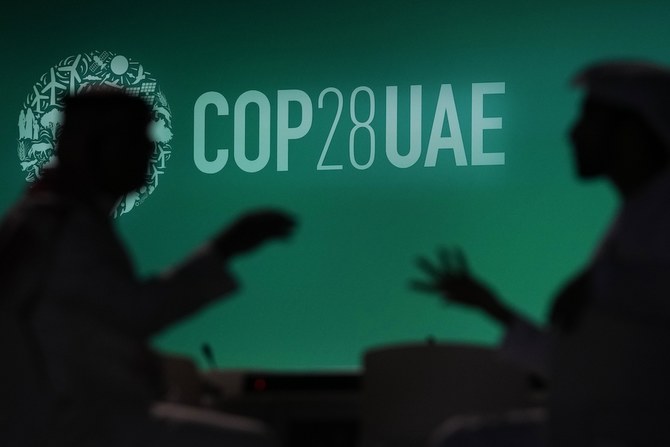Strong political will in rich world key to COP28 success

https://arab.news/puwz7
As the global climate change summit COP28 gets underway in Dubai today, the mood is perhaps more positive than on the eve of many previous gatherings.
This is partly due to some progress made in the recent weeks and clarity over how things may shape. But success is far from guaranteed and will depend significantly on a strong political will displayed by rich nations at the meeting to take the hard, but necessary, decisions needed to ensure success.
The final countdown to yet another global climate change summit has begun as delegations from well over 100 nations and representatives of thousands of business associations, multilateral institutions and of course environmental nongovernmental organizations begin arriving in Dubai, the host of COP28.
At the first glance, it looks like the pulsating vibrancy of the Middle East’s most happening city has rubbed off on a global gathering which normally moves at an excruciatingly slow pace, as negotiators from across the world, representing diverse and often conflicting interests, hold on to their positions as if their lives depended on it. And very often, if not their lives, then at least their livelihoods, do depend on the outcome of negotiations.
This is the reason that most of the meetings of climate change have begun on morose and dull notes, with rather low expectations, despite attempts by the hosts and many of the participants to hype up the potential gains from the meeting.
But as we gather for COP28 in Dubai, things do look different for many reasons and there is more cause for cautious optimism this time around than there has been perhaps since the Paris meeting in December 2015.
Some of the credit for the optimism must of course go to COP28 President Sultan Ahmed Al-Jaber, who is also the head of the state-owned oil and gas giant ADNOC. In January, when he was named President of COP28, the decision was met with criticism, especially from large environmental groups who feared that Jaber would indulge in greenwashing, while protecting the oil and gas industry, rather than forcing a rapid phase-out of fossil fuels.
For almost 15 years, the rich nations have failed to keep their commitment of providing at least $100 billion per annum to developing countries to help them make the transition towards clean energy and hence cut their carbon emissions
Ranvir Nayar
As we head into the meeting, that criticism stands cast aside as Al-Jaber has already intensively engaged with the oil and gas industry, with the objective to have some sort of agreement on a phase-down schedule.
In the run up to COP28, Jaber’s role has been critical not just in the fossil fuel sector, but also in another critical area – renewable energy. There is now widespread support for an effort led by the UAE, the EU and the US to triple global renewable energy production by 2030. As energy is the biggest emitter of carbon dioxide, a faster shift will automatically mean lesser reliance on fossil fuels.
In this context, a recent agreement between the US and China to resume cooperation in curbing carbon emissions is also another major boost to COP28 before the hard part of the negotiations begin.
And it is here that the will power of the leaders of the Western world will come into play. There are a number of benchmarks set for this meeting, which comes exactly midway between the signing of the Paris Climate Agreement and 2030, which is the target year for a significant drop in carbon emissions.
One of the first things on the agenda in Dubai is the global stocktake, a five-yearly review of the progress, or lack of progress, in meeting various targets set under the Paris Agreement or at subsequent meetings. The stocktake is almost certain to ring another alarm, as a recent report by the UN Framework Convention on Climate Change said the actions taken by various governments around the world so far were almost set to propel the world towards climate catastrophe.
This means that at Dubai, the governments of the world, especially the rich countries, would have to commit to far more aggressive cuts in their carbon emissions, under the Nationally Determined Contributions scheme, than has been the case so far.
For several decades, the rich world agreed with the principle that historical pollution has been due to them and hence they need to cut their emissions in a far more ambitious manner than their NDCs or what they have achieved so far. Yet, the last few years have seen the Western world track back on this principle and instead seek equally ambitious cuts from the developing countries, notably China, India and Indonesia. Getting the rich nations to back this long-standing, principled view will be one of the biggest challenges for Jaber at the meeting.
But perhaps an even bigger challenge than this false equality is the issue of climate finance. For almost 15 years, the rich nations have failed to keep their commitment of providing at least $100 billion per annum to developing countries to help them make the transition towards clean energy and hence cut their carbon emissions.
While even in a good year, the West been unable to meet even 70 percent of its commitment, the requirement has now risen far above the previous sum. Most recent estimates suggest that the developing nations would need nearer $1.3 trillion every year, almost 20 times what the rich countries have been giving.
Another important point that will be heavily debated at COP28 is the issue of the alarming debt levels of the developing countries and the increasing calls for the rich nations and multilateral institutions, like the World Bank or the International Monetary Fund, to waive these arrears.
Andreas Sieber, associate director of Global Policy of 350.org, a global climate change advocacy group, said in a press release in the run up to the conference that to facilitate the global renewable energy transition, “we need debt cancellation at scale, $100 billion in concessional finance per year, and $200 billion in grants per year.”
Within the issue of climate finance lies another contentious topic – a loss and damage fund that is meant to allow the countries worst hit by the impacts of climate change to be able to access financial support. Though the fund’s creation had been decided, the agreement leaves out most of the practical details for its setting up, its replenishment, its usage and its implementation.
So far, the developed nations have kept the issue off the negotiating table, but it may no longer be possible for them to ignore this matter for long.
On the balance, when the COP28 negotiations get underway, there are adequate positives for the negotiators to focus on and strike some early agreements which could set the ball rolling for the more difficult bits.
The leaders of the nations can show the way ahead by striking up some quick, but meaningful deals when they meet as part of the meeting of the heads of states, on Dec. 1 and 2. In case the leaders do manage to arrive at some breakthrough, it would infuse a lot of confidence in the rest of the negotiations ahead. After all it is not for nothing that they say a job well begun is a job half done.
• Ranvir Nayar is the Managing Editor of Media India Group, Founder-Director of EIF












































